Search
Did you mean: Ugarit?
Summary 
Loading AI-generated summary based on World History Encyclopedia articles ...
Search Results
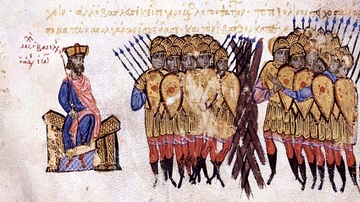
Image
Michael IV the Paphlagonian in Bulgaria
Michael Iv the Paphlagonian and his men in front of a Bulgarian barricade.
Madrid Skylitzes, late 11th century CE
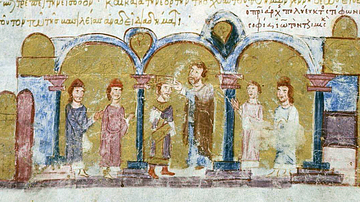
Definition
John I Tzimiskes
John I Tzimiskes was Byzantine emperor from 969 to 976 CE. Although he took the throne by murdering his predecessor Nikephoros II Phokas, John was a popular emperor. A skilled general and a competent politician, he is known for expanding...
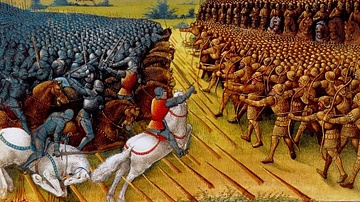
Definition
Battle of Nicopolis
The Battle of Nicopolis in September 1396 CE, also known as the Nicopolis Crusade, was an attempt by French, Hungarian, and other European allies to curb the threat of the Ottoman Turks as they pressed ever westwards into Europe. Nicopolis...
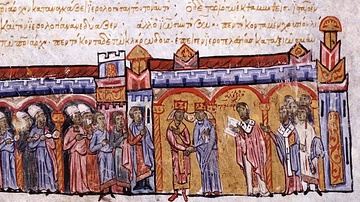
Definition
Michael IV the Paphlagonian
Michael IV the Paphlagonian was Byzantine emperor from 1034 to 1041 CE. He had an affair with Empress Zoe, then married her and was crowned emperor after the death of her first husband, Romanos III. He ran a competent regime that kept the...
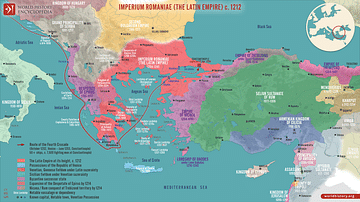
Definition
Empire of Nicaea
The Empire of Nicaea was a successor state to the Byzantine Empire, or rather a Byzantine Empire in exile lasting from 1204 to 1261 CE. The Empire of Nicaea was founded in the aftermath of the sacking of Constantinople during the Fourth Crusade...
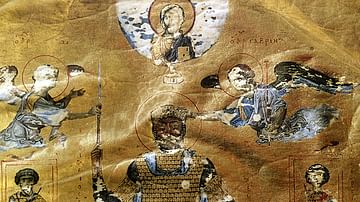
Definition
Basil II
Basil II (aka Basilius II) was the emperor of the Byzantine Empire from 976 to 1025 CE. He became known as the Bulgar-Slayer (Bulgaroktonos) for his exploits in conquering ancient Bulgaria, sweet revenge for his infamous defeat at Trajan's...
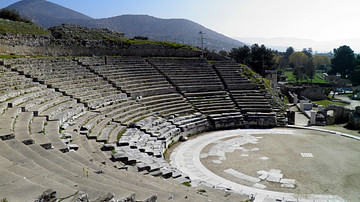
Article
Macedonian Colonization Under Philip II
Philip II of Macedon (359-336 BCE) envisaged a broad Macedonian kingdom and his colonial expansion resulted in the forging of an empire that his son Alexander the Great (r. 336-323 BCE) would use as a springboard for even greater things...
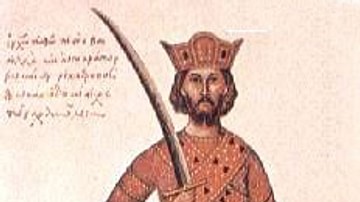
Definition
Nikephoros II Phokas
Nikephoros II Phokas was Byzantine emperor from 963 to 969 CE. Known as “White Death of the Saracens,” Nikephoros was a fearsome commander who conquered Crete, Cilicia, and much of Syria. While he is known as a great military commander, he...
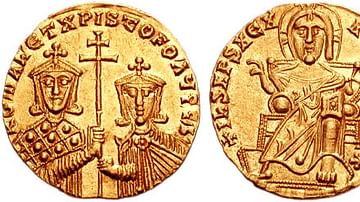
Definition
Romanos I
Romanos I Lekapenos (“the Ignorant”) was emperor of the Byzantine Empire from 920 to 944 CE. Of Armenian descent, he was a military commander who usurped the throne to rule as co-emperor with the rightful heir, but still minor, Constantine...
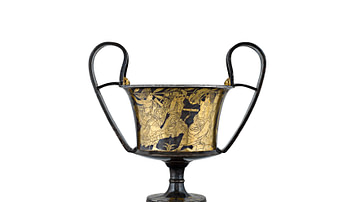
Article
Foreign Influences & Imported Luxuries in Thrace
Defining Thracian art is a difficult task due to the fact that what we call today Thrace was never a single unified state but, rather, a collection of many independent communities (or tribes) who formed both alliances and rivalries with each...